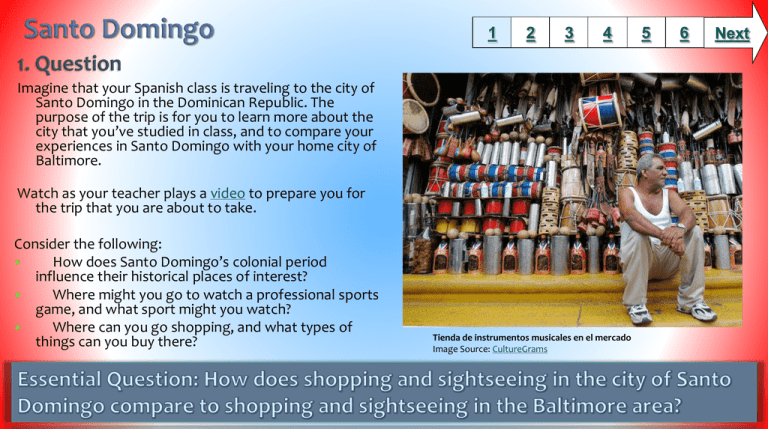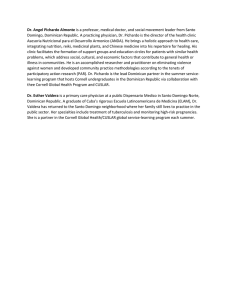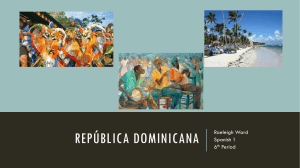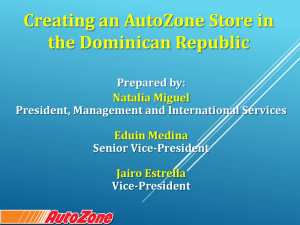
1
2
3
4
Imagine that your Spanish class is traveling to the city of
Santo Domingo in the Dominican Republic. The
purpose of the trip is for you to learn more about the
city that you’ve studied in class, and to compare your
experiences in Santo Domingo with your home city of
Baltimore.
Watch as your teacher plays a video to prepare you for
the trip that you are about to take.
Consider the following:
How does Santo Domingo’s colonial period
influence their historical places of interest?
Where might you go to watch a professional sports
game, and what sport might you watch?
Where can you go shopping, and what types of
things can you buy there?
Tienda de instrumentos musicales en el mercado
Image Source: CultureGrams
5
6
Next
1
Explore the links below to learn more about both cities:
Santo Domingo
Lonely Planet: Santo Domingo
CultureGrams: Dominican Republic (Check out the links to
photo gallery and slideshows to the right; diet, recreation,
and the arts to the left under Lifestyle.)
Virtual tour: Santo Domingo
Go Dominican Republic
Baltimore
Lonely planet: Baltimore (“Sights” link is the most useful)
World Book: Baltimore (Cultural life and Recreation
sections)
Historic places in Baltimore
Both
Google maps (Search for Santo Domingo, Dominican
Republic and Baltimore, MD. Zoom in to street view to
explore.)
As you travel, you will take notes and compare your experiences
in Santo Domingo to your experiences in your home city of
Baltimore. Use a graphic organizer found on the next page.
Don’t forget to cite your sources!
2
3
4
Casas coloniales
Image Source: CultureGrams
=I can do this on my own
=Challenge me!
5
6
Next
1
2
You are now traveling in Santo Domingo and will
make your comparisons between Santo Domingo
and Baltimore, based on the links that you
explored on the previous slide. You are choosing
5 places of interest to visit. You may wish to
include information on foods, shopping areas,
museums, the arts, tourist attractions,
monuments, famous buildings, parks/plazas,
and/or anything else that you feel is important.
As you find information, take notes using this Online
Venn Diagram (see tutorial) so that you can easily
access your information later for your assessment
activity. Be sure to include URLs where you found
the information.
Please see the rubric for more details about how
your notes will be graded.
El baile merengue
Image Source: CultureGrams
3
4
5
6
Next
1
Now you have returned from your trip. You enjoyed your
experience in the Dominican Republic so much that
you want to convince your friends and family to
leave Baltimore and visit Santo Domingo.
Create an electronic interactive presentation (such as
Prezi) in Spanish that includes all of the information
from your notes and photos of the places in Santo
Domingo that you chose. Use the preterite past
tense.
Use images in your Prezi that are copyright-free or from
sources licensed by BCPS.
You will present your Prezi out loud in Spanish in front of
the class. Be prepared to speak on the date that your
teacher assigns.
Be sure to write in Spanish and to cite all of your sources
in MLA format, including for the photos that you use.
Follow the rubric for your assessment activity.
2
El palacio del gobierno
Image Source: CultureGrams
3
4
5
6
Next
1
2
3
4
5
6
Next
All of your hard work has paid off, and you have
convinced some of your friends to go to Santo
Domingo. In addition to the great things that they’ve
heard from you, they want to experience a holiday
celebration during their trip.
Explore these sites to learn more about holidays in Santo
Domingo.
CultureGrams- Dominican Republic holidays
New York Times- Carnaval in the Dominican
Republic
Soul of America- Dominican Republic festivals and
traditions
Choose one holiday that you feel is the most
interesting. In your Prezi, tell your friends why you
think that they would enjoy celebrating that
holiday. Remember to make comparisons to a
holiday that you celebrate in Baltimore.
La Navidad en la playa
Image Source: CultureGrams
1
Spanish 2
BCPS Curriculum
11. Compare objects and symbols from the target culture to those found in their own, including food,
buildings and monuments, and art.
Maryland State Curriculum
1.3 Students present information, concepts, and ideas to an audience of listeners or readers on a wide
variety of topics in the target language.
4.2 Students demonstrate an understanding of the concept of culture through comparisons of the cultures
studied and their own.
Common Core State Standards
Reading: 1. Read closely to determine what the text says explicitly and to make logical inferences from it;
cite specific textual evidence when writing or speaking to support conclusions drawn from the text.
Writing: 7. Conduct short as well as more sustained research projects based on focused questions,
demonstrating understanding of the subject under investigation.
Standards for the 21st Century Learner
1.1.6 Read, view, and listen for information presented in any format (e.g. textual, visual, media, digital) in
order to make inferences and gather meaning.
2.1.3 Use strategies to draw conclusions from information and apply knowledge to curricular areas, realworld situations, and further investigations.
ISTE NETS - National Educational Technology Standards for Students
3. Research and Information Fluency: Students apply digital tools to gather, evaluate, and use information.
b. Locate, organize, analyze, evaluate, synthesize, and ethically use information from a variety of
sources and media.
4. Critical Thinking, Problem Solving, and Decision Making: Students use critical thinking skills to plan and
conduct research, manage projects, solve problems, and make informed decisions using appropriate
digital tools and resources. c. Collect and analyze data to identify solutions and/or make informed
decisions.
2
3
4
5
6
Time Frame:
Two 90 minute class period. Students may require additional
time outside of class to complete the assessment activity. An
additional period may be required for oral presentations.
Differentiation:
Direct students to use comprehension tools included in
databases, such as: audio read-aloud, labeled reading levels,
and embedded dictionaries.
Learning Styles:
Visual, auditory, tactile, reflective, global understanding,
analytical understanding, field dependent, field independent.
AVID Strategies:
Inquiry based learning, use of Costa’s and Bloom’s questioning
Notes to the teacher:
Consult with your School Library Media Specialist to implement
this lesson.
You may wish to use a tool such as Edmodo to electronically
distribute and collect this assignment.
YouTube video on slide 1 must be shown to the class using a
teacher account in school. Student accounts do not have access to
YouTube.
You may wish to add point values to the rubric.
Last updated: July 2014
Created by AMBER BICKHART, School Library Media Intern
BCPS Slam Dunk Research Model, Copyright 2012, Baltimore County Public Schools, MD, all rights reserved. The models may be used for educational, non-profit school use only.
All other uses, transmissions, and duplications are prohibited unless permission is granted expressly. This lesson is based on Jamie McKenzie’s Slam Dunk Lesson module.



